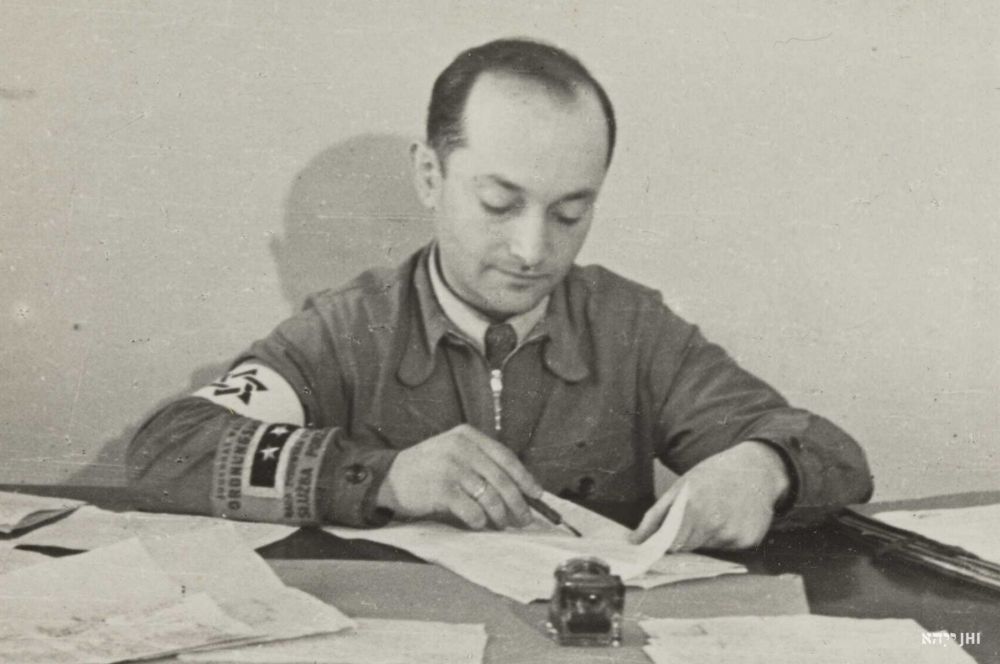Jakub (Józef) Lejkin. The photo comes from an album documenting the work of the Order Service in the Warsaw Ghetto in 1940-1941. JHI collection, Central Judaic Library


Jakub (Józef) Lejkin. The photo comes from an album documenting the work of the Order Service in the Warsaw Ghetto in 1940-1941. JHI collection, Central Judaic Library
After the Germans created the ghetto, Jakub Lejkin, like many other lawyers of Jewish origin, joined the Jewish police. The inhabitants of the ghetto accused him of cruelty and serving the Germans. Due to efficient capture of people to labor camps, Lejkin was promoted in the ranks of the police. In July 1942, he was already the deputy commandant, he soon became the commandant. On July 20, “on the orders of [Adam] Czerniaków [head of Jewish Council], he announced through loudspeakers that all rumors about the upcoming deportation were unfounded.” [1] The brutality of the Jewish police during the great deportation led to the death sentence on Lejkin issued by the JCO, which was established in August 1942.
A little, comic little man who would be more suited to a circus than to command the police. Or maybe he fits both? He performed his work with a smile on his face, in a good and nast.y mood. Today he delivered so many “heads”, tomorrow he will provide so much and so much – live not die. No bullet had hit him yet. [2]
– wrote Yehoshua Perle.
The Warsaw attorney, Mr. Lejkin, one of the leading figures of the SP [Order Service], was so concerned about the obligation to deliver slaves (and at the same time candidates for runners to a better world) for the Germans that in one night he caught 1,600 Jews from their beds or basements and personally delivered them alive to Collegium, from where they were also sent to camps. [3]
– wrote the anonymous correspondent of Oneg Szabat, signing “Amas Freund”.
– wrote Emanuel Ringelblum. – A mysterious hand killed Lejkin, who bears primary responsibility for the deportation, [5] he added.
![lejkin_obwieszczenie_zw1.jpg [497.69 KB]](https://www.jhi.pl/storage/image/core_files/2022/3/14/9dc1449a4e73c5bfb2ed9a82064da3ff/jpg/jhi/preview/lejkin_obwieszczenie_zw1.jpg)
The prose Judgment on Lejkin was written by Władysław Szlengel. The piece has not survived, but is summarized by Ringelblum:
Various Gestapo men stand before God. Kohn and Heller boast about how many Jews they saved from German clutches. When Lejkin appears, a tumult arises in the crowd. Thousands of Jews murdered in Treblinka come running. Lejkin is silent. From his squeezed larynx there is only one word: “Order”, that is, everything he did, he carried out according to the order, not on his own initiative, the Jewish Community is to blame for everything. The assembled crowd pronounces one word in a whisper: “Deceived.” There are curses, shouts of “Bread with marmalade.” People are furious: Why were they cheated with bread and marmalade, told that the deportees were headed east, but in fact they were sent to Treblinka. [6]
Lejkin was shot by Eliahu Różański, a member of Hashomer Hatzair, born in 1923 in Warsaw. During the great deportation in the summer of 1942, he escaped from a transport to Treblinka. He was assisted in the attack on Lejkin by Mordechaj Growaser and Margalit Landau, daughter of Aleksander Landau, an entrepreneur and member of the Oneg Shabbat group. Różański was killed on January 18, 1943, on the first day of the January self-defense – the first open fight between the Germans and the Jews in Warsaw. Margalit also fell in battle that day.
– And you know, after the war someone told me that Lejkin, this policeman whom we shot in the ghetto, had his first child born after seventeen years of marriage and he thought that he would save them with his zeal [7]– said Marek Edelman years later.